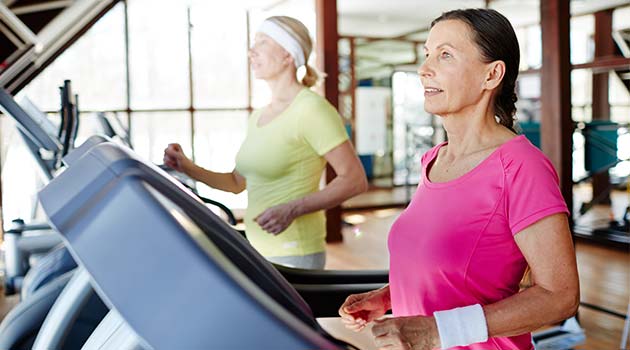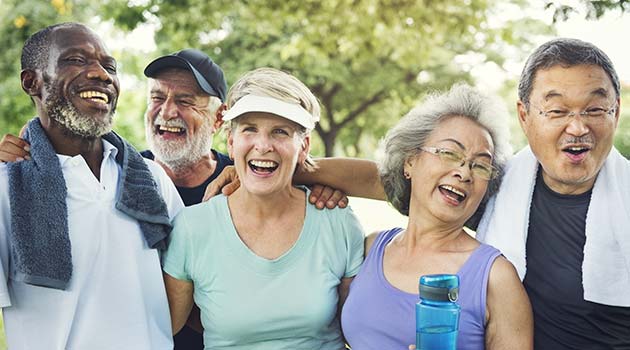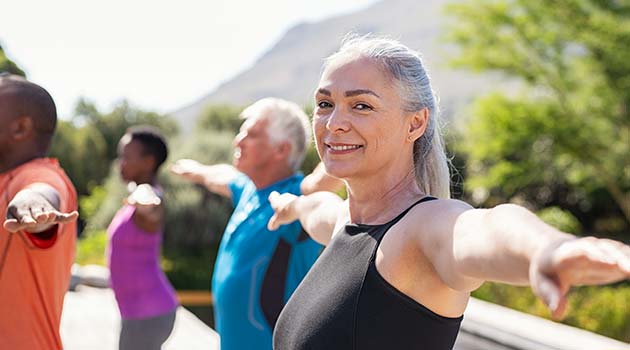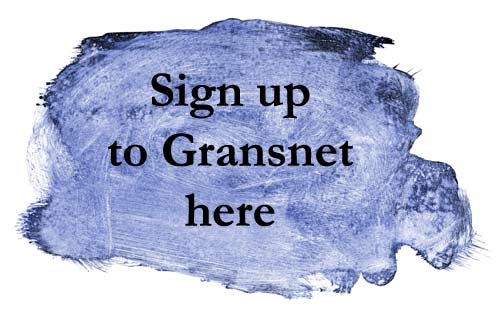Brussels police ordered to attend a right wing conference attended by Braverman and Farage

Exercise over 50 - what's the most effective?
 Exercise - it's something we all need but many of us struggle to find the motivation to do. In fact, our survey results revealed that over a quarter of us don't enjoy exercise. But with the undeniable benefits of improved mental and physical wellbeing, it's really important to make some sort of activity a part of your life. If you really do find it too much of a chore, then it may be that you haven't found a workout that's right for you yet. As our bodies and lifestyles change as get older, so too should our exercise routines. With that in mind, here's our guide to the best exercise for over 50s.
Exercise - it's something we all need but many of us struggle to find the motivation to do. In fact, our survey results revealed that over a quarter of us don't enjoy exercise. But with the undeniable benefits of improved mental and physical wellbeing, it's really important to make some sort of activity a part of your life. If you really do find it too much of a chore, then it may be that you haven't found a workout that's right for you yet. As our bodies and lifestyles change as get older, so too should our exercise routines. With that in mind, here's our guide to the best exercise for over 50s.
NOTE: some of these group classes are subject to current coronavirus restrictions
The benefits of exercise over 50 | 8 exercises to lose weight or build strength
Balance exercises | How to motivate yourself | Exercise in your daily routine
Get the latest health and exercise advice delivered straight to your inbox...
The benefits of exercise over 50
Keeping fit is beneficial at any age, but exercising over 50 is essential in maintaining a healthy lifestyle as you grow older. Here are just some of the benefits of working up a sweat:
- It keeps your mind sharp. Regular exercise over the age of 50 improves cognitive function, including memory.
- It improves your mental health. Far from just having physical benefits, taking the time to exercise can significantly improve your overall wellbeing too, with the NHS noting that exercise can help those with mild depression.
- It can help maintain muscle mass. Incorporating strength training into your exercise regime is key to slowing down the loss of muscle mass that comes with ageing. Keeping active is also important for your bones, as maintaining bone density can reduce the risk of falls.
- It may reduce your risk of certain illnesses. The risk of heart disease, certain types of cancer and diabetes developing can be reduced by regular physical activity.
8 best exercises for over 50s to lose weight or build strength
Firstly, it may be a little harder, but it absolutely is possible to shift weight if you're over 50. Yes, our metabolisms are slowing down, and the menopause does tend to lead to weight gain, particularly round the middle, but gransnetters are full of success stories. Most agree that the solution is simple: 'Eat less and move more.' But are some exercises better than others?

Most would agree that a comprehensive exercise plan will have the best results. That is, one that includes cardio that gets your heart rate up such as running or brisk walking, as well as resistance training (weights, resistance bands). And remember that, as in the case of all new exercise routines, you must check with your GP first, especially if you have any medical issues.
1. Walking
Many gransnetters aim for 10,000 steps a day. Obviously an idle amble isn't going to do as much good as a brisk walk, so to really reap the benefits you should aim to get the blood pumping and a light sweat on. The joy of walking is that wherever you live - urban or rural - there will be somewhere nearby to explore. Oh, and it's free, so the pros of this exercise really do stack up.
"I walk for half an hour, four to five days a week but also walk to the local shop or to my daughter's and the pool a few times a week too."
2. Running
Running provides a wide range of physical and mental health benefits, from decreasing the risk of heart disease to lowering stress levels. Again, you can tailor your running routine to suit you - whether that's choosing to run outdoors or in a gym, and also opting for the length and speed that suits you.
"I took up running when I was 59 and did two half marathons. I now go for short runs as often as I can manage it."
3. Pilates
Pilates is an excellent core body workout and has added benefits in helping back and joint pain and improving posture. It's become increasingly popular amongst over 50s in recent years, and its influence doesn't appear to be slowing down soon.
"I honestly thought I was quite fit as I am on the go most of the time, work two days a week and walk most places but by heck, I didn't realise how weak my core muscles are. I would recommend classes to anyone who has the time to go."
4. Tai chi
A wonderfully relaxing exercise with numerous health benefits, both physical and mental. Many women over 50 love this low-impact activity which is easy on muscles and can help with mobility and flexibility. There are many classes for beginners across the country, and you can find one near you in our guide to tai chi for over 50s.
"Having experienced tai chi I can really see how beneficial it could be, as both gentle and effective exercise and an excellent way of learning to relax. Learning the sequences is a very good exercise for the brain as well so I would recommend it, but try to find a class that is more suitable for beginners."
5. Yoga

Excellent for flexibility and balance, yoga is a favourite of gransnetters, for good reason. With a multitude of health benefits, there's research that suggests this exercise can prevent high blood pressure, heart disease, and alleviate aches and pains. Plus, it's a stress-buster too, making it a great way to unwind after a tough day.
"I definitely feel fairly flexible and am pretty sure that yoga is keeping me healthy in mind and body."
6. Resistance exercises
Think exercises involving weights are just for bodybuilders? Think again! Strength training is a key type of exercise that's important as we get older as it helps maintain muscle mass. You can use resistance machines at the gym or try weight training with light dumbbells. It could be worth investing in a session with a personal trainer so you make sure you do the right exercises to meet your goals and execute them with the correct form to avoid injury.
"I use machines at my gym that involve resistance weights to build muscle. My arms, legs, bum and shoulders are much stronger and less flabby since I started. I only do it twice a week."
But there are plenty of other options that don't require any equipment at all, and which can easily be done at home. Don't worry if you're not sure how to get started. Annie Deadman, personal trainer, pilates instructor and author of the best-selling book The 21 Day Blast Plan, demonstrates exactly what to do here (with options for those who might have injuries or other issues that make exercising difficult).
7. Swimming
Swimming is one of those few exercises that gives a full body workout, and helps to strengthen different muscle groups, depending on the style you do, whilst also improving your cardiovascular system. If doing the same movement for your entire workout doesn't sound appealing to you, why not try an aqua aerobics class? It's a fun, social way of incorporating aerobics and strength training into your exercise regime.
"Now that I'm retired, I can find time twice a week to swim a mile (64 lengths, 45 mins). As a result I am feeling stronger and fitter than I have been in many years."
8. Zumba or dance-based exercise classes
Perfect for those who get bored easily and find listening to music helps with motivation, ZumbaGold classes are aimed at people who are 50 plus, and offer low impact exercises with the same benefits as the original version.
"I have arthritis in my spine and hips and am a size 16. I was the oldest in the Zumba class, so don't be put off. This one is really good fun and I have released my inner Shakira!"
Balance exercises
Feel more steady on your feet with simple and easy balance exercises to try at home using a chair or the kitchen work surface. Fitness expert Julie Robinson from Move It Or Lose It demonstrates a handful of these exercises to help you improve your balance in just five minutes.
Never miss out on health and fitness tips by signing up to our daily newsletter
How to motivate yourself to exercise
Feeling motivated to exercise regularly can be tricky, but here are a few tips to help you get started.
1. Find an exercise you actually enjoy doing
If you love being outside instead of in a gym, then a brisk stroll or run around your local park or neighbourhood is the thing for you.
- If you love music and dancing, Zumba is a definite must.
- If you like being part of a team, then you could consider joining a running club.
- If you're competitive by nature, perhaps tennis or a similar sport would be the right thing for you.
2. Find a partner in crime
Never underestimate the power of peer pressure. Rope in a friend, a neighbour, your daughter, or better yet, a dog! Anyone you can convince who would benefit from a bit of exercise. Be each other's support and motivator as they could help you to work harder and burn more calories. But do choose your exercise partner well, unlike this gransnetter.
"I have a walking companion who tops or belittles everything I say and buys 'only the best'. With that and farting as she walks, a fun Sunday morning is had!"
3. Set realistic goals
If you want to run a marathon, that's great, but if you currently can't walk round the block without collapsing, then it's probably not achievable in the short term. The best motivator is to achieve smaller goals step by step and then move on to the next stage.
Try Couch to 5K if you're interested in running, or pick a yoga move that you'd like to master and use YouTube videos to work on it a few times a week. Once you've achieved those goals, move on to the next. This way you'll be climbing a mountain in bite-size stages instead of sprinting to the top but running out of air halfway up.

4. Make it a habit
The secret to creating a new habit is making the action as easy as possible. So, if you're planning on exercising first thing, lay out your workout gear and trainers the night before. Promise yourself you'll stick to it for just two weeks. After that time, you're very likely to have slipped into a routine and, hey presto, the exercise habit is formed.
5. Treat yourself
Clearly a piece of cake or glass of wine after each workout will probably negate all your efforts, so try rewarding yourself when you reach your goals with a new pair of trainers, a manicure or an early night with a film.
How to incorporate exercise into your everyday routine
Gardening
If you're looking to get active without it feeling like a workout, regular gardening not only has the benefit of getting you into the fresh air and upping your Vitamin D, but it also means your outdoor space will be weed-free and beautiful year round. Just be cautious not to overdo the bending and damage your back.
"I get into the garden as much as possible - also helps my light levels."
Childcare
Arguably the very best kind of exercise for mind, body and spirit, looking after the grandkids is beneficial for all involved. Exhausting, yes. Rewarding, most definitely! Don't rely on screens to keep them occupied and take a look at these wonderful ideas to keep kids entertained. You're sure to end the day happy, tired and definitely well-exercised.
Walking the dog
If you don't do it for yourself, do it for the wellbeing of your dog. Take a slightly longer walk, try a different route, throw a ball in the park. Every extra step makes a difference.
"I have dogs, so an hour for them is minimum really. The dogs are a boon, because I have to go out whatever the weather."
There are plenty more tips, advice and support on diet and exercise on our forums, so come and share your successes or challenges.
Disclaimer: The information on our diet and fitness pages is only intended as an informal guide and should not be treated as a substitute for medical advice. Gransnet would urge you to consult your GP before you begin any diet if you're concerned about your weight, have existing health conditions and/or are taking medication.
Images: Shutterstock


